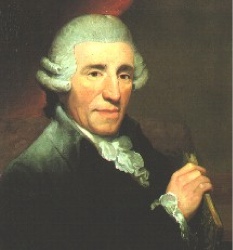
Haydn and Mozart at the Queen Elizabeth Hall As
he wrote 104 symphonies, it's inevitable that a particular handful get most of
the exposure: so it was useful to be able to hear three of the less well-known
ones at yesterday evening's concert at the Queen Elizabeth Hall. The Orchestra
of the Age of Enlightement, conducted by Edward Gardner, performed numbers 7, 64 and 90,
in proper period style using original instruments (or modern copes of them) and
in the first two works including the harpsichord continuo which modern
performances avoid. As
he wrote 104 symphonies, it's inevitable that a particular handful get most of
the exposure: so it was useful to be able to hear three of the less well-known
ones at yesterday evening's concert at the Queen Elizabeth Hall. The Orchestra
of the Age of Enlightement, conducted by Edward Gardner, performed numbers 7, 64 and 90,
in proper period style using original instruments (or modern copes of them) and
in the first two works including the harpsichord continuo which modern
performances avoid.Number 7, 'Le Midi', was performed by the small orchestra Haydn originally expected - only three each of 1st and 2nd violins, for example - and is a lightweight but engaging piece which includes, unusually, a solo for the single double-bass. Haydn scrawled the phrase 'Tempora mutantur' (Times change) on the score of number 64, and this has become the work's title: here Haydn was able to use a full-sized orchestra and his symphonic style was more fully developed. Number 90 was composed shortly before his very successful period in England, and shows him in the full confidence of his composing powers: a more complex construction and a distinct wit - including a false ending intended to catch the audience out (it worked). In all three the use of the period instruments and techniques gave the works the spring and liveliness which many modern performances tend to mute. The other work, which began the second half, was Mozart's 2nd flute concerto, performed by orchestra member Lisa Beznosiuk on a period flute - wood instead of metal, and without the complex array of keys on a modern flute: the tone is gentler than a modern flute, with something of the sound of a recorder. The concerto makes considerable demands on what must be a more difficult instrument to play than the modern version, and Ms. Beznosiuk gave a skilled and involving performance. The background to the flute concertos is a little odd: Mozart was comissioned by one Ferdinand Dejean to compose three flute concertos: the fee was to be 200 florins and the concertos were to be short and easy (Dejean was an amateur flautist). In the event Mozart delivered only two, both full-length and difficult, and the second was simply a transcription of the Oboe Concerto: Dejean was not pleased, and Mozart received only 96 florins. Plainly listening to his own music had done little for Mozart's intelligence. A recording of this concert will be broadcast on BBC Radio 3 on 10th July. Posted: Fri - April 24, 2009 at 09:32 AM by Roger Wilmut |
Quick Links
About Me:
Roger Wilmut XML/RSS Feed
MY PODCAST
Archives
Calendar
Blogroll
WEBRINGS
Statistics
Total entries in this category: Published On: Mar 11, 2016 05:00 PM |
||||||||||||||||||


